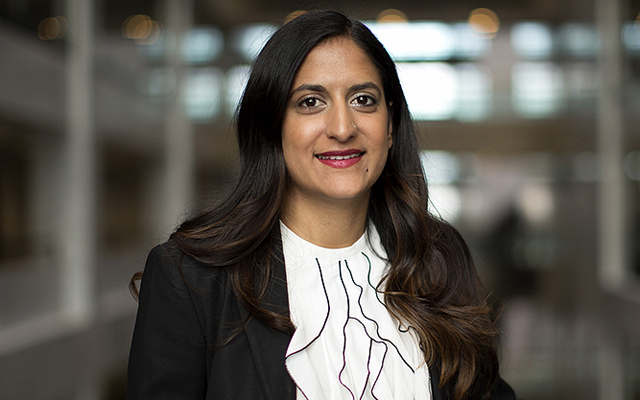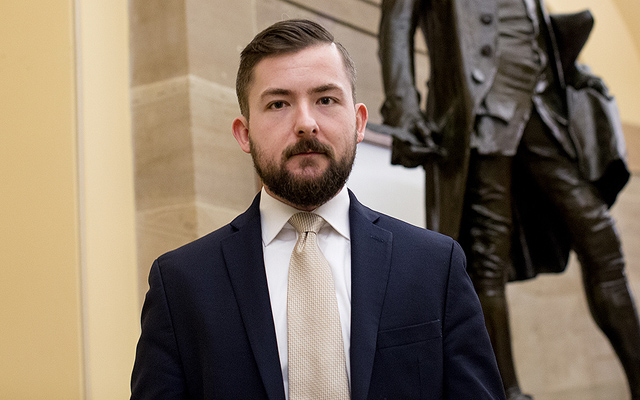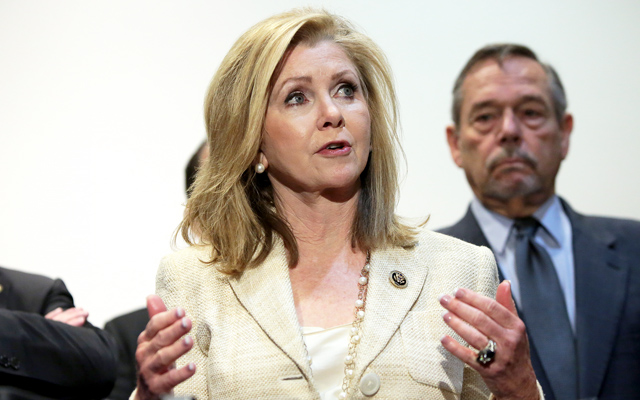16 people to watch in tech
James Hairston, Head of public policy, Oculus
His boss at the campus’s tech support team, Dustin Moskovitz, was working on the project. Hairston joined the company in 2013 after spending time in the Obama administration.
{mosads}He’s now the top policy staffer for California-based Oculus on issues related to virtual reality and artificial intelligence, which are expected to have a huge global impact in the decades to come.
“Because it’s early days and we’re still exploring all of the really awesome uses for this technology, everybody’s sort of coming at it pretty new,” he said of his current challenge.
Chris Lewis, Vice president, Public Knowledge
Chris Lewis, vice president of advocacy work for Public Knowledge, has been in the eye of the storm at the Federal Communications Commission (FCC).
Now, he’ll be playing defense against the Trump administration.
Lewis, 37, organized for former President Obama’s 2008 campaign, which led to a stint with the tech policy team on the transition, part of a larger effort by former FCC Chairman Tom Wheeler.
Now, with Wheeler’s time in office over, Lewis says the group will push on.
“We’ll continue to put out policy ideas in our writing and in our advocacy that we think are important to maintain the openness of the internet, preserve consumer choice, protect consumers as they use new technology, preserve the basic values that people believe in,” Lewis said.

David Redl, Chief counsel for communications and technology, House Energy and Commerce Committee
It’s always been about airwaves for David Redl.
Since he studied journalism at Pennsylvania State University, Redl as been looking at the regulations covering broadcasters. That led to a stint at the Federal Communications Commission and at CTIA, the wireless lobby, before he landed on the House Energy and Commerce Committee. Then-Chairman Fred Upton (R-Mich.) gave him an order: help write the law that would trigger a landmark auction of broadcast spectrum to the wireless industry.
“I’m in a position to actually get to see just four years afterwards whether or not the law that I helped my bosses write and get signed into law will do what we want it to do,” Redl said.

Rep. Ted Lieu (D-Calif.)
The California Democrat is also a colonel in the Air Force reserves and a prominent voice on technology and cybersecurity.
Lieu has been most noted as an opponent of weakening encryption but has also weighed in on mobile device security and how medical institutions should respond to ransomware.
“As a kid, I remember my first computer was an Apple II, and it was the coolest thing in the universe,” Lieu told The Hill. “The folks who went through technology when they were young and still use it now have a different view of tech policy than those who are just beginning to see its advantages and disadvantages.”
Erica Baker, Build and release engineer, Slack
Baker won national attention when her spreadsheet of internal salaries at Google revealed pay inequities across the search giant’s offices.
Shortly after the spreadsheet became pubic, Baker left Google for Slack. She had connected with Slack CEO Stewart Butterfield on Twitter while protesting a grand jury’s decision not to indict Ferguson, Mo., police officer Darren Wilson for shooting and killing Michael Brown.
“I thought, ‘Wow, the CEO of this company is paying attention to what’s going on in the world,’ ” Baker told Yahoo Finance. “He is woke. I want to go work [with] him.”
Baker is advising Slack internally on ways to make the company more inclusive and is the co-founder of Project Include, an organization that aims to make tech more diverse.
Rachel Haot, Managing director, 1776
Rachel Haot, 33, is managing director for startup incubator 1776 in Washington, D.C., a role that allows her to help tech companies bridge the gap with government and maneuver through complex regulatory structures.
She’s made a career of bringing public service and technology together, including a stint as former New York Mayor Michael Bloomberg’s (I) chief digital officer.
She later served the same role for New York Gov. Andrew Cuomo (D). In both jobs, she focused on streamlining the way governments serve the public using technology.
“I would say that I’ve always been interested in the public sector and technology. I see a huge opportunity for technology to improve the way that the public is served,” she said.

Kara van Stralen, Policy adviser to Sen. Cory Booker (D-N.J.)
Kara van Stralen, 29, has bipartisan bona fides that would make most Democrats shutter.
Sen. Cory Booker’s (D-N.J.) tech adviser was essential to wrangling Sen. Ted Cruz (R-Texas) as an unlikely co-sponsor for legislation that used federal emergency funds to restore public broadcasting as a communication tool after disasters.
“Technology is really one of the less charged partisan issues,” she said. “Aside from maybe the recent net neutrality debates, it’s really something where people can really come together, find common ground — everybody wants to promote technology in their home states.”
Booker’s donor roster is rich with Silicon Valley talent. And with his political star rising quickly, van Stralen’s is a face to watch.
Tarah Wheeler, Principal security advocate, Symantec
Tarah Wheeler is an unofficial ambassador to the hacking community who, as Symantec’s security advocate, is reaching out to a subculture that ranges from military-trained hackers to political rebels to high school dropouts.
The idea is to use the hacking community to create tougher cybersecurity.
“Sometimes very smart people don’t have the kind of patience for the kind of systematic evaluation that goes into making a product,” Wheeler told The Hill.
“But once they’ve created something beautiful that can protect a lot of people, I can get that product to a wider group of people,” she said. “There’s something romantic about being a hacker in your basement, but Symantec protects 16 billion user sessions a day.”
Wheeler also advocates for women’s broader presence in a tech industry that often struggles to retain women in engineering roles rather than marketing or project management ones.
This year she wrote “Women in Tech,” a practical advice guide for women entering the tech industry, featuring stories from important figures such as Brianna Wu, a game developer who faced harassment during the “Gamergate” controversy.

Alan Carroll, Senior professional staffer, House Homeland Security Committee
Carroll was one of the lead authors of the committee’s 2016 report on encryption. His subcommittee, on counterterrorism and intelligence, is tasked with figuring out “what’s coming down the pipe, what’s coming next and how can we try to position the committee to solve that and push for solutions.”
Carroll, 27, came to the committee in 2010 with fluency in tech policy, and he said it has been a “trial by fire.” But increasingly, counterterrorism means talking about technology and social media.
“The number of cases that are affected by the abuse of encryption technologies by bad actors is going to grow. At the same time, the reliance and importance of encryption technologies to the marketplace and the average American is going to grow as well,” Carroll said.
Rep. Will Hurd (R-Texas)
“I understand our adversaries because I’d been chasing them or defending against them in the CIA. I understand the capabilities that people have as well as where our weaknesses are,” Hurd, 39, said.
After leaving the spy agency, the Texas Republican worked for a private consulting firm that was engaged in defending computer networks.
Since his election in 2014, Hurd has established himself as one of the few lawmakers who understand security policy from a technical side.
The chairman of the House Oversight Subcommittee on Information Technology, Hurd has taken a leading role in championing issues like federal IT modernization and procurement.
Katie Moussouris, Founder and CEO, Luta Security
Katie Moussouris, 42, has done more to help connect governments and major organizations with flaw-finding hackers than almost anyone else in the field.
The author of both Symantec’s and Microsoft’s vulnerability disclosure policies, Moussouris was instrumental in starting the Department of Defense’s “bug bounty” initiative.
Her company, Luta Security, is the first to offer consulting for businesses to help them develop internal processes for handling vulnerabilities.
“My company is poised to bring government and industry into the arms of hackers who are waiting to help them,” Moussouris said.
But her goal is bigger than that. Although bug bounties — rewards for people who identify and report security holes — are gaining in popularity, experts say the bounties alone aren’t enough for hackers to make a living.
“When I think about big-picture stuff, I think about ways we can shift the next generation of hackers to not have to choose between defense and getting paid,” Moussouris said. “That’s kind of my mission.”
Brandi Collins, Campaign director for media and economic justice, Color of Change
A lawyer by trade, Brandi Collins works at the digital civil rights organization Color of Change, where she focuses on the behind-the-scenes mechanisms of data regulation that can result in discrimination.
Part of her mission is lobbying for privacy policies that prevent personal data from being used by large corporations and governments in ways that disproportionately affect people of color.
“Information that may seem innocuous to a lot of folks is often a proxy for race,” she said.
Collins, 35, has worked to push through tougher privacy rules at the Federal Communications Commission, crack down on discrimination on home-sharing platform Airbnb and limit the use of controversial cellphone surveillance tools known as stingrays.
Collins started out wanting to ensure that black Americans were able to participate in their own media narrative, but she quickly realized that the challenge was much bigger than how their stories were told on the local news.
“You keep going up. Who owns the bits and bytes?” she said. “For me, there’s this larger piece around dignity and participation in our world. If you look at media representation, whoever controls our media shapes and controls our culture. For too long, black folks have been deprived of telling our own stories.”
Alison Macrina, Creator, Library Freedom Project
Alison Macrina, 31, is the go-to privacy technology advocate for libraries across North America.
With her project, Macrina tours the country to teach librarians about privacy issues. Library Freedom also argues against controversial copyright protection software known as digital rights management and advocates for open source software.
She says people started to care more about privacy after former NSA contractor Edward Snowden revealed the government’s spying programs.
“We held a privacy forum at the library with the Massachusetts [American Civil Liberties Union]. There was a sense of despair and fear, and people wanted to do something but didn’t know what,” she said.
Josh Corman, Founder, I Am The Cavalry
It is a problem security researchers have been talking about for years. But no one made much headway in getting device manufacturers to change their ways until Josh Corman, 41, founded the advocacy group I Am The Cavalry.
Now, Corman is the hacker in the room when device security is discussed.
“I think it was [Luta Security founder] Katie Moussouris that said it to me first, but she said, ‘If we want to change the world, we’re going to have to change ourselves first,’ ” Corman said.
“We’re terrible at empathy,” he added. “I think the cornerstone of every discernible piece of success we’ve had is because we led with empathy.”

Rep. Marsha Blackburn (R-Tenn.)
A 15-year-veteran of Congress, Blackburn is known as an enthusiastic opponent of the Federal Communications Commission’s net neutrality rules, which she tried to repeal through legislation multiple times during the Obama administration.
But now that the Tennessee Republican holds the gavel of the House Commerce Subcommittee on Communications and Technology, her focus will be trying to bring high-speed internet access to rural communities.
“The expansion of rural broadband is probably the biggest infrastructure issue of this decade,” she told The Hill. “We hear a lot about it from our counties. I have 19 counties in my district; 16 are rural, and 16 have issues with broadband access.
“These counties that are seeking to bring back jobs in manufacturing and call centers or logistics hubs — they are not able to do it until they have that high-speed internet connection.”
Rep. Suzan DelBene (D-Wash.)
These days, the Washington Democrat is using her background to push Congress to look at ways tech can play a role in infrastructure.
In 2015, she and Rep. Darrell Issa (R-Calif.) teamed up to launch the Internet of Things Caucus to educate Congress on connected devices and their role in public policy.
“Folks talk about infrastructure, and most of the examples are roads and bridges, which are also very important, but it also can be combined with new technologies that allow us to build new types of infrastructure at lower cost that might be more efficient and longer lasting,” DelBene told The Hill.
“We can use technology like the internet of things, different types of connected sensors when we’re building, for example, transportation systems that allow us to understand what’s happening with traffic patterns that may help us adjust to deal with traffic better.”
Copyright 2024 Nexstar Media Inc. All rights reserved. This material may not be published, broadcast, rewritten, or redistributed..











